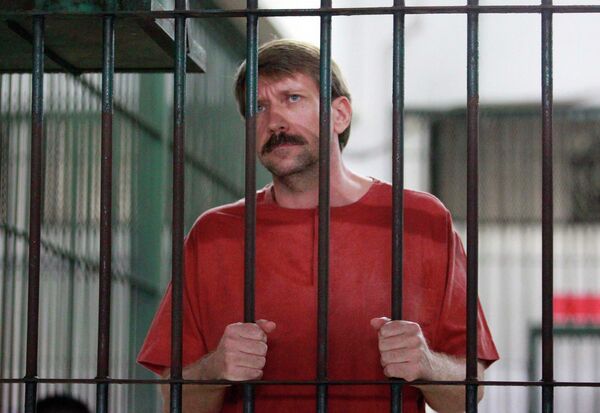A court in Bangkok on Wednesday looked into the circumstances of Viktor Bout's extradition to the United States. The alleged Russian arms dealer will stand trial there in October, and the American court assigned to hear Bout's case is unlikely to give any serious attention to the details of his handover. In Thailand the affair is apparently being used as a pretext to attack the country's former prime minister, who honored the extradition request.
Who is Mr. Bout?
Thailand found itself involved in the Bout case in 2008 when the Russian businessman was arrested in Bangkok's Sofitel hotel following a sting operation staged by American special services. It may be standard practice in the U.S. for secret agents disguised as potential buyers to goad a suspected arms dealer into an on-record confessions. But in Thailand and other countries, incriminating people using such methods is seen as rather controversial. This is why Bout's arrest and the two-year proceedings on his U.S. extradition have raised so many questions in Thailand.
Bout's story is a complicated one. In the eyes of the American public, he is an arms baron, perhaps the world's most infamous. His infamy does not mean, however, that he is guilty of the arms smuggling charges brought against him in the U.S.
Some observers argue that the Bout affair was fabricated by a group of American investigators who had spent a lot of time and money trying unsuccessfully to find conclusive evidence that this man is, indeed, an arms dealer. They say the sting operation at Sofitel was a face-saving measure.
The true story may take years to uncover, and we may never learn the whole truth. There is much more clarity on the extradition procedure, though. An analysis of Thai court rulings - which upheld the U.S. extradition request and then rejected it - suggests that the country's judiciary could see no legitimate grounds for Bout's extradition and considered his case far-fetched. But under heavy pressure from Washington, they eventually agreed to surrender Bout to the U.S.
It looks like Bout's fate was decided by Abhisit Vejjajiva, who became the new prime minister of Thailand in December 2008.
Who is Mr. Vejjajiva?
At the request of Bout's lawyers, the inquiry focuses on the actions taken by Vejjajiva and members of his cabinet ahead of the extradition. It is still unclear who decided to extradite the Russian businessman to the U.S. and how the decision was made. Vejjajiva and some of his ministers admitted to the cabinet's involvement while others denied it. But whoever made the final decision, the Americans eventually got their way - largely in violation of Thai law.
It is former Prime Minister Vejjajiva and his inner circle that the inquiry panel aims to bring to justice. And it seems to be a mere coincidence that the attack on Vejjajiva's legacy has begun with the Bout case. This process could have just as well started with an investigation into the government's May 2010 crackdown on opposition protesters, which left at least 91 people dead.
The supporters of Vejjajiva, seen as a pro-Western politician and a representative of the liberal elite, are in opposition to the majority of the Thai population, who back former premier Thaksin Shinawatra and his allies. The fierce standoff between these two camps has not escalated to a civil war so far, but it has moved far beyond a normal political struggle. Characteristically, Vejjajiva never ran for prime minister but instead came to power through legislative maneuvers. Now, at last, he will be replaced by Thaksin Shinawtra's sister, Yingluck, whose party won the national election in July.
Vejjajiva is dubbed, quite aptly, Thailand's Yushchenko. Indeed, he and the former Ukrainian leader have quite a lot of things in common. Both men's rise to power was tainted by controversy. Both want to orient their countries toward the West. And both resorted to persecuting political opponents.
Curiously, such people often get away with things for which others are punished severely. The Thai government's crackdown on the Bangkok riots in May last year is not much different from the current violent campaigns that the authorities in Syria and Libya have unleashed against protesters. Yet, Vejjajiva - a man with dual Thai and British citizenship - benefits from the West's double standard.
Consequences and lessons
Traditionally, Thailand's society is neither anti-Western, nor anti-American. It respects tolerance and moderation.
Anti-Western sentiment has emerged recently only as a reaction to Vejjajiva's excessive efforts to make Thailand pro-Western. As a result of this policy, vehement opponents of Thaksin Shinawatra have now come to accept the exiled premier. Now he can return to his country, have himself cleared of all charges, and again become a key figure in national politics. Even in exile he has continued to be a major political player in Thailand.
In countries neighboring Thailand and in some distant Asian nations, few people know Yushchenko. Vejjajiva, by contrast, is a household name across the continent. A careful analysis of the effects of his actions could make other Asian nations better equipped to handle U.S. extradition requests that may come their way some day.
The views expressed in this article are the author's and do not necessarily represent those of RIA Novosti.



